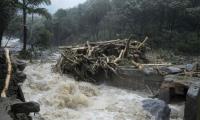India Prioritizes Poor Fishermen at WTO Meeting
India advocates for protecting poor fishermen's interests at the upcoming WTO ministerial meeting in Abu Dhabi, focusing on fishing subsidies.
New Delhi, Jan 24 (PTI) Protecting the interest of the poor and marginal fishermen will be the top priority of India at the ministerial-level meeting of the World Trade Organization (WTO) next month in Abu Dhabi, a senior government official said on Wednesday.
Issues pertaining to support measures given to fishermen will figure during the discussions in the meeting.
Members of the Geneva-based WTO on June 17, 2022, secured a 'Geneva Package' which included agreement on curbing harmful fishing subsidies. The countries are now negotiating the other issues of the agreement which include overfishing and overcapacity of fish stocks.
The 164 trade ministers will gather at Abu Dhabi from February 26-29 to deliberate on various issues including this pact. It will be the 13th ministerial conference (MC). MC is the highest decision-making body and it meets once after two years.
"Our top priority will be to protect the interest of poor fishermen. About 90 lakh people are dependent on the sector in India," the official said.
As part of this, India has proposed that developing countries be allowed to give subsidies to their poor fishermen to catch fish till exclusive economic zones (EEZs) or up to 200 nautical miles from the shore; while rich countries engaged in fishing beyond this zone should stop providing any kind of subsidies for the next 25 years.
In the WTO's agreement on agriculture, livelihood and resource poor fishermen are defined and the same definitions are being taken here.
"As part of special and differential treatment (S&DT) in the agreement, we are demanding a complete carve-out for poor fishermen within EEZ. We should be free to provide subsidies to poor fishermen up to 200 nautical miles.
"We will not undertake any discipline forever. Beyond EEZ, there are Regional Fisheries Management Organizations (RFMOs), when we undertake fishing activities in these RFMOs, we should be given a longer period for providing subsidies," the official said.
Developing countries like India needs this policy space to develop the fishing sector.
Countries like Norway, China, Japan and the US undertake distant water fishing and provide huge subsidies to their fishing community.
The official also said that the process is on to ratify the first part of the fisheries subsidies agreement, which was agreed upon by the WTO members in Geneva in 2022.
The fisheries agreement finalised would prohibit developed countries, engaged in distant water fishing, not to provide subsidies for illegal, unreported and unregulated fishing activities.
Acceptance by two-thirds of WTO members is needed to bring the agreement into effect. So far, 55 countries have ratified. India has not yet ratified the pact. There are 164 members.
Trade experts and some members of civil society have urged India not to ratify the agreement. They have stated that developed countries have large industrial fishing fleets and they provide billions of dollars of subsidies to industrial fishing.
Issues pertaining to support measures given to fishermen will figure during the discussions in the meeting.
Members of the Geneva-based WTO on June 17, 2022, secured a 'Geneva Package' which included agreement on curbing harmful fishing subsidies. The countries are now negotiating the other issues of the agreement which include overfishing and overcapacity of fish stocks.
The 164 trade ministers will gather at Abu Dhabi from February 26-29 to deliberate on various issues including this pact. It will be the 13th ministerial conference (MC). MC is the highest decision-making body and it meets once after two years.
"Our top priority will be to protect the interest of poor fishermen. About 90 lakh people are dependent on the sector in India," the official said.
As part of this, India has proposed that developing countries be allowed to give subsidies to their poor fishermen to catch fish till exclusive economic zones (EEZs) or up to 200 nautical miles from the shore; while rich countries engaged in fishing beyond this zone should stop providing any kind of subsidies for the next 25 years.
In the WTO's agreement on agriculture, livelihood and resource poor fishermen are defined and the same definitions are being taken here.
"As part of special and differential treatment (S&DT) in the agreement, we are demanding a complete carve-out for poor fishermen within EEZ. We should be free to provide subsidies to poor fishermen up to 200 nautical miles.
"We will not undertake any discipline forever. Beyond EEZ, there are Regional Fisheries Management Organizations (RFMOs), when we undertake fishing activities in these RFMOs, we should be given a longer period for providing subsidies," the official said.
Developing countries like India needs this policy space to develop the fishing sector.
Countries like Norway, China, Japan and the US undertake distant water fishing and provide huge subsidies to their fishing community.
The official also said that the process is on to ratify the first part of the fisheries subsidies agreement, which was agreed upon by the WTO members in Geneva in 2022.
The fisheries agreement finalised would prohibit developed countries, engaged in distant water fishing, not to provide subsidies for illegal, unreported and unregulated fishing activities.
Acceptance by two-thirds of WTO members is needed to bring the agreement into effect. So far, 55 countries have ratified. India has not yet ratified the pact. There are 164 members.
Trade experts and some members of civil society have urged India not to ratify the agreement. They have stated that developed countries have large industrial fishing fleets and they provide billions of dollars of subsidies to industrial fishing.
You May Like To Read
TODAY'S MOST TRADED COMPANIES
- Company Name
- Price
- Volume
- Vodafone Idea L
- 8.10 (+ 18.94)
- 352105814
- GTL Infrastructure
- 1.50 (+ 7.14)
- 20982285
- G G Engineering
- 0.90 (+ 11.11)
- 20091512
- AvanceTechnologies
- 0.54 ( -8.47)
- 18780688
- YES Bank Ltd.
- 17.33 (+ 2.61)
- 14468025






 © 2025 Rediff.com India Limited. All rights reserved.
© 2025 Rediff.com India Limited. All rights reserved.